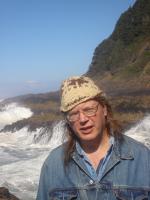Shopping at “Elusive Furniture”
Yes, don’t judge a book by its cover (it might just be a product of what artists the writer or publisher know) but I can appreciate intriguing art wherever it appears, including on the cover of Other Sacred (Bald Trickster Press, 2023). Something of multicolored pieces with a lot of wire wrapping and spirals, could be a pendant or a heavy earring. Also has some resemblance to a double bass. The background is black and white handprints, in an indigenous Australian style.
The poems in Other Sacred give us many colorful pieces with a wide range of observations and wonderings. There’s a whole section on jazz and its makers. And throughout the book are the shadows and results of man’s interactions with nature.
The first two sections are titled “Incantations” and “Auguries,” two methods of influencing or understanding our times and actions, both dependent on precise, evocative language, Here’s the opening of “Second Sight”:
“The river call, with its profile
For tracing all paths to sight,
Find s a tiny fire behind her eye
As it is razor-carved in moonlight”
While many of these poems are rooted in concrete settings (“West Berlin.” “Santa Anna’s”) energetic, surrealistic language finds a way in, as in “The Dissecting Table:”
“The conical shape of an umbrella,
A vacuum cleaner in the forest
That defines a slump, a stable
As libelous as a shade of violet.”
The poems in these first two sections tend to be under 20 lines, while bumpy with wild imagery and surprising observations. Smith then gets quite expansive, linguistically and conceptually, in “Eleven Roads to the Meeting Place” (which has six poems). A definite Whitmanic feel here—though the language more prosodic then Walt’s—from “The Mississippi” to “Down the PCH” (Pacific Coast Highway), with truckers, bison, railroad workers and others.
The first poem, “The Mississippi” begins:
“A canopy of ether, whispering angels, air bridges
Over oil-stained roads, the hallelujah of truck stops
With stratospheric lunches, as cooks transmute
Potatoes and heels of meatloaf into gold.”
There’s so much love and examination of America here, leading to the book’s fourth and warmest-hearted section “Griots,” which is about jazz and its people. It begins with the prose memoir “At the Five Spot.” Monk, Mingus and others from this prime age of jazz hang out, including Cannonball Adderley in “The Man from Dillard High”:
“This guy shows up in New York
Blows solos with his eyes closed
Tastes each note in runs that make
The hip set shake their heads in wonder.”
Smith’s passion for jazz, fired by time hearing it live in New York and California, produce some of my favorite poems in the book, like “Third Set”:
“They lace it all into prefix,
Paved rent in a hotel with no beds.
Killer taxis down 2nd Avenue,
Going from dark product
To a burst of drunken fire
On the towers of Emily’s bridge.”
Smith was the editor (stopped just last year) of the well-regarded Caliban and Caliban Online, spanning 38 years, and leaning toward the progressive side of poetry, prose and visuals. While Smith’s poems here are a little more to the conventional side of craft—which helps to emphasize the breadth of his knowledge and openness as editor—the depth of feeling and observation in these poems is as sharp as anyone, regardless of style.
Lawrence R. Smith packs a lot of wonder into Other Sacred, as well as craft, intelligence, and, especially, love for the worlds around him.

dan raphael's most recent books are In the Wordshed, from Last Word Press, and Maps Menus Emanations, from cyberwit. More recent poems appear in Impspired, Mad Swirl, Lothlorien, Otoliths and A Too Powerful Word. Most Wednesdays dan writes & records a currents event poem for The KBOO Evening News in Portland, Oregon.


